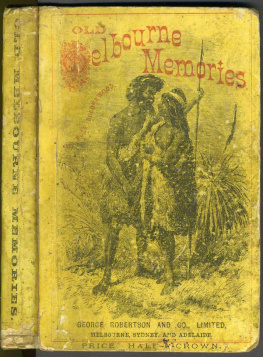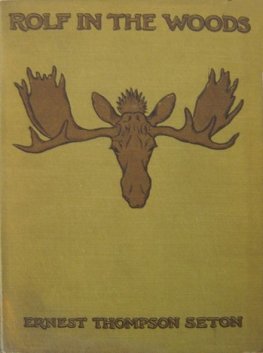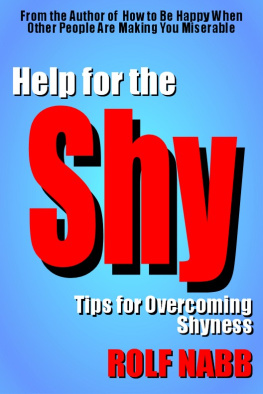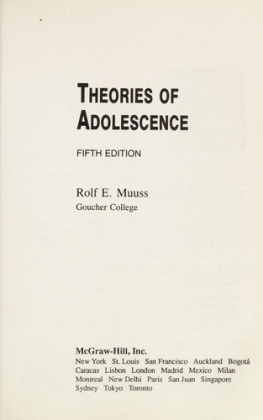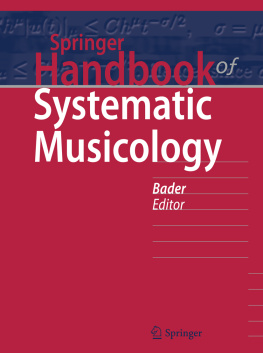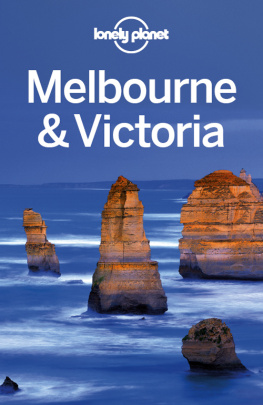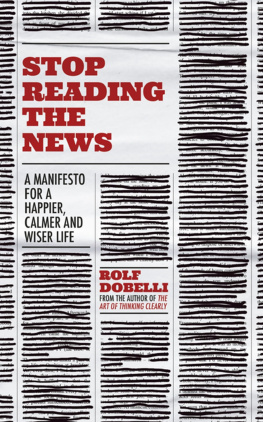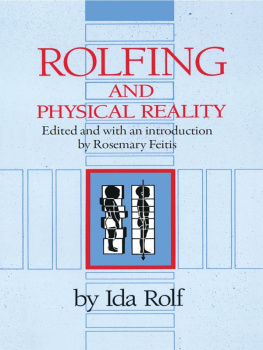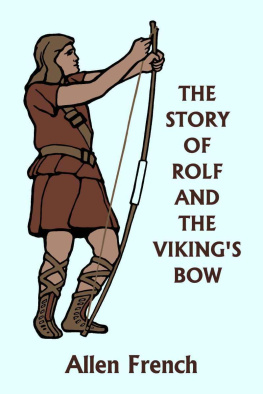| Note: | Images of the original pages are available through Internet Archive. See https://archive.org/details/oldmelbournememo00bold |
OLD MELBOURNE MEMORIES
logo
OLD MELBOURNE
MEMORIES
BY
ROLF BOLDREWOOD
AUTHOR OF
'MY RUN HOME,' 'THE SQUATTER'S DREAM,' 'ROBBERY UNDER ARMS,' ETC.
SECOND EDITION, REVISED
London
MACMILLAN AND CO., Ltd.
NEW YORK: MACMILLAN & CO.
1896
All rights reserved
TO
MY EARLIEST ADMIRER AND MOST INDULGENT CRITIC
My Dearest Mother
FROM WHOM
I DERIVE THE WRITING FACULTY
AND
TO WHOM IS CHIEFLY DUE WHATEVER MEED OF PRAISE
MY READERS MAY HEREAFTER VOUCHSAFE
PREFACE
These reminiscences of the early days of Melbournea city which, as a family, we helped to foundawakened, when first published in the columns of the Australasian, an amount of general interest most gratifying to the writer.
It is hoped that, in their present more convenient form, they may secure and retain the approbation of the public.
I should feel bound to apologise for the mention of names in full were I not conscious that I have written no line calculated to offend; nor have I, for one moment, failed in sincere goodwill towards every comrade of that joyous time.
CHAPTER I A.D. 1840
Standing in the gathering winterly twilight, at the intersection of Elizabeth and Flinders Streets, one instinctively remarks the long crowded suburban trains, laden with homeward-bound passengers, quitting the city and care for the night's charmed interval. All the streets of busy Melbourne are yet thronged, in spite of the apparently rapid diminution which is proceeding. The indefinable hum, noticeable in large urban populations at the close of the day, as the lamps are lit, which mark for most men the boundary between work and recreation, is increasingly audible. The grand outlines of the larger public buildings become suggestively indistinct. If your ear be good, you may hear the steam-whistle and the roar of the country trains at Spencer Street Station. The senses of the musing spectator are filled to saturation with the sights and sounds proper to the largest, the most highly civilised, the most prosperous city in the world, for the years of its existence. Stranger than fiction does it not seem, that in the month of April, in the year of grace 1840, we should have migrated en famille from Sydney to assist in the colonisation of Port Phillip, in the founding of this city of Melbourne? The moderate-sized schooner which carried us safely hither in a few hours under a week had been chartered by Paterfamilias, so that we were unrestricted as to many matters not usually left to the discretion of passengers. It was a floating home. Colonists of ten years' standing, we had many things to bear with us, which under other circumstances of transit must have been left behind. There were carriage horses and cows, the boys' ponies, the children's canaries, poultry, and pigeons, dogs and cats, babies and nurses, furniture, flower-pots, workmen, house servantsall the component portions of a large household shifted bodily from a suburban home, and ready to be transferred to the first suitable dwelling in the new settlement. One can easily imagine to what a state of misery and confusion such a freight would have been reduced had bad weather come on. But the winds and the waves were kind, and on Saturday afternoon the harbour-master of Williamstown partook of some slight alcoholic refreshment on board, and welcomed us to Port Phillip. Well is remembered even now the richly-green appearance of the under-stocked grassy flat upon which the particularly small village of Williamstown stood. A few cottages, more hutswith certain public-houses, of coursemade up the township. More distinctly marked even were the succulence and juiciness of the first Port Phillip mutton-chops upon which was regaled our keenly hungry party. We had just quitted the enfeebled meat markets of Sydney, scarce recovered from that terrible drought which wasted the years of 1837, 1838, and 1839. We had reached a land of Goshen evidentlya land of milk and butter, if not of honeya land of chops and steaks, of sirloins and "under-cuts"of all youthful luxuries well-nigh forgottenof late unattainable in New South Wales as strawberry ice in a cane-brake.
Among other trifles which our very complete outfit had comprehended was a small steamboat adapted for the tortuous but necessary navigation of the Yarra Yarra, of which noble stream, moving calmly through walls of ti-tree, we commenced to make the acquaintance. This steamerletshe was a very tiny automaton, puffing out of all proportion to her speedbut the only funnel-bearerthink of that, Victorians of this high-pressure era!had been sent down by the head of the family the voyage before, safely bestowed upon the deck of a larger vessel. "The Movastar was a better boat," I daresay, but the tiny Firefly bore us and the Lares and Penates of many other "first families"in the sense of prioritysafely to terra firma on the north side of what was then called the "Yarra Basin." This was an oval-shaped natural enlargement of the average width of the river, much as a waterhole in a creek exceeds the ordinary channel. The energetic Batman and the sturdy Cobbett of the south, Pascoe Fawkner, had thought it good to set about making a town, and here we found the bustling Britisher of the period engaged in building up Melbourne with might and main. Our leader laid it down at that time, as the result of his experience of many lands, that the new colony, being outside of 36 deg. south latitude, would not be scourged with droughts as had been New South Wales from her commencement. In great measure, and absolutely as regarding the western portions of Victoria, this prophecy has been borne out.
Sufficient time had elapsed for the army of mechanics, then established in Port Phillip, to erect many weatherboard and a few brick houses. Into a cottage of the latter construction we were hastily inducted, pending the finishing of a two-storied mansion in Flinders Street, not very far from Prince's Bridge. Bridge was there none in those days, it is hardly necessary to say; not even the humble one with wooden piers that spanned the stream later, and connected Melbourne people with the sandy forest of South Yarra, then much despised for its alleged agricultural inferiority: still there was a punt. You could get across, but not always when you wanted. And I recall the incident of Captain Brunswick Smyth, late of the 50th Regiment, and the first commandant of mounted police, riding down to the ferry, from which the guardian was absent"sick, or drunk, or suthin"and, with military impatience, dashing on board with a brace of troopers, who pulled the lumbering barge across, and fastened her to the farther shore.

